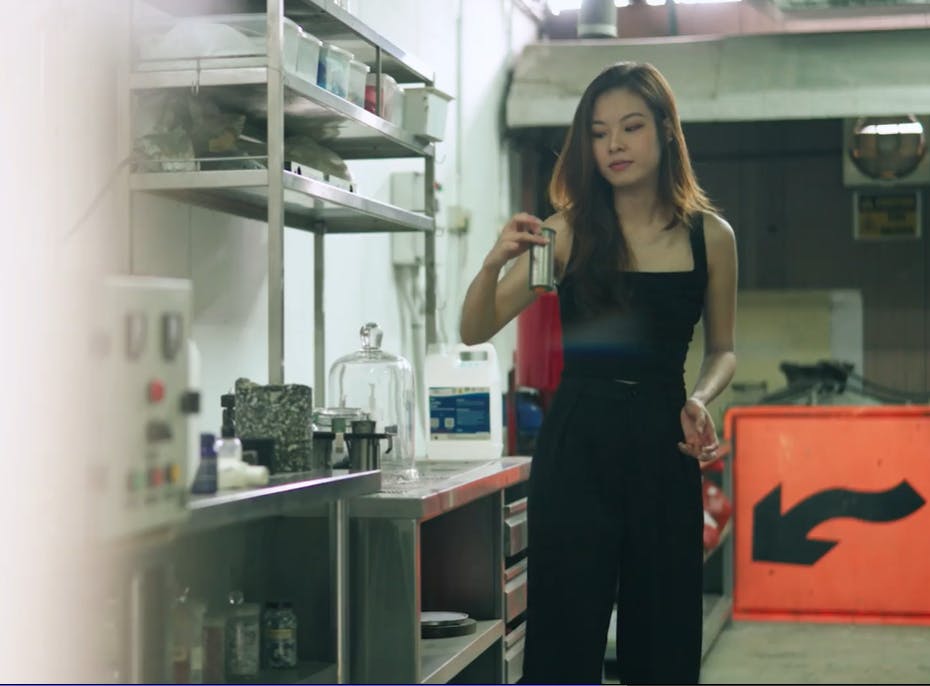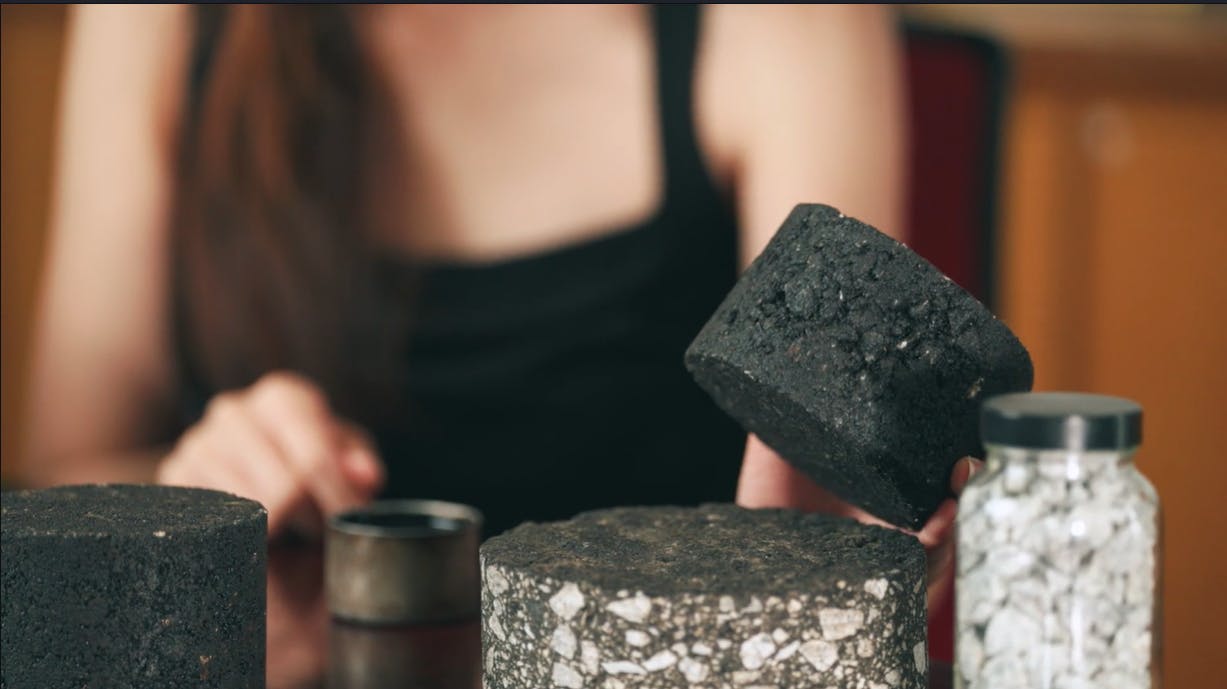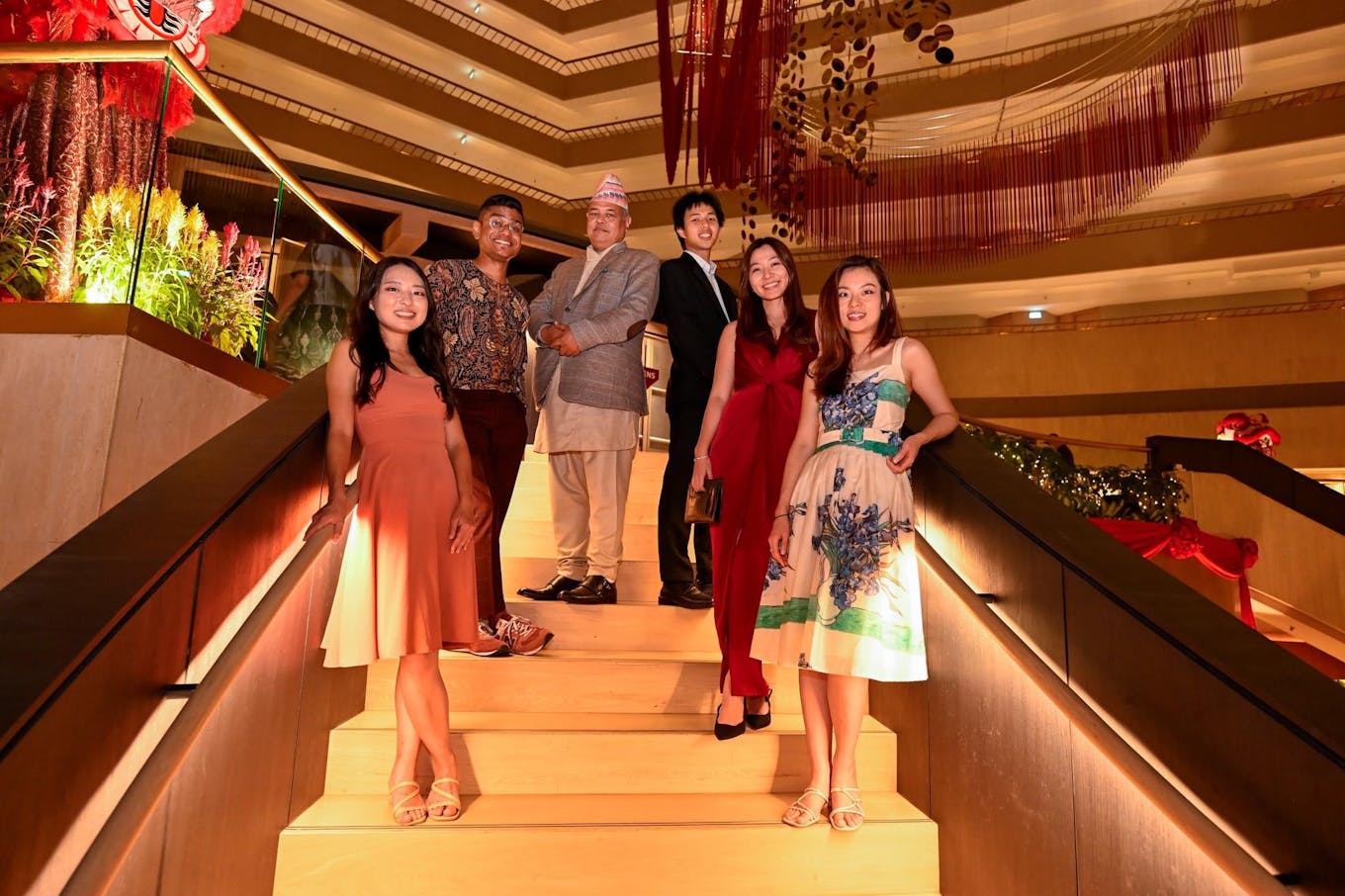Oh Chu Xian’s decision to launch a startup that utilises waste plastic to pave roads was born out of sheer frustration when she saw how Singapore handled its rubbish.
To continue reading, subscribe to Eco‑Business.
There's something for everyone. We offer a range of subscription plans.
- Access our stories and receive our Insights Weekly newsletter with the free EB Member plan.
- Unlock unlimited access to our content and archive with EB Circle.
- Publish your content with EB Premium.
After realising that the refuse she had placed in recycling receptacles was either incinerated or exported elsewhere to China and Southeast Asian countries including Indonesia, Malaysia, Thailand and Vietnam, she knew she had to take matters into her own hands.
“It dawned on me: if these countries stop accepting our waste, what will happen to it? Singapore may have efficient incinerators, but will that be enough?” questioned Oh, who is the founder of Magorium, a Singapore-based deep tech firm that focuses on sustainable solutions for plastic waste.
Oh also learnt how the waste sent to various Southeast Asian countries was adversely affecting local residents. “People, especially those in villages, would wake up to find rubbish burning near their homes, which caused toxic fumes and led to health issues,” she said.
“The environment minister of Malaysia eventually sent our rubbish back to us. It was clear that Singapore needed more solutions to solve its plastic waste issue.”
Since then, Singapore has passed a law that restricts plastic exporters from shipping out contaminated materials, aligned with the Basel Convention, and export can be done only when receiving countries give prior informed consent. However, many companies in the city-state still struggle with handling difficult-to-recycle plastic.
Oh’s family – mainly her paternal relatives – who have been in the road construction and asphalt manufacturing business for almost five decades was coincidentally also busy researching alternative materials to pave new roads. They were looking for a more economical solution to produce bitumen – a byproduct of crude oil and the most common binder used in paving roads.
“We were already researching alternative materials for road construction and plastic waste emerged as a very promising option,” she said.
Her family experimented with incorporating plastic into asphalt mix, replacing the bitumen with depolymerised plastic, which they called NEWBitumen. The highly durable mix could match the robustness of traditional bitumen-based roads, explained Oh.
She knew they had stumbled upon a unique formula and one that could address two key problems: the construction industry’s heavy reliance on crude oil, and Singapore’s lingering waste plastic issue.
“This gave me the confidence to spin off our technology into a startup,” she said.
Oh founded Magorium in 2019 alongside her sister, Shu Xian, to commercialise their solution.
Oh is one of 10 winners in this year’s Eco-Business Sustainability Leadership Youth A-List awards, which celebrates movers and shakers in the sustainability sector within Asia Pacific.
She tells Eco-Business about the startup’s humble beginnings, how the company will address Singapore’s waste plastic issue with its unique material, and why the key to gaining support from clients is communicating a more compelling narrative.
Magorium was founded in 2019. What has been your biggest challenge so far? How have companies reacted to your paved roads?
Our technology straddles both waste management and construction, and both industries can be quite conservative. We set out to introduce a new way to manage waste and pave roads, and the latter has been done in the same way for over 100 years. The industry is also still profitable, so many have asked why we would fix a process that isn’t broken.
But after learning about how Singapore is handling waste and seeing so much plastic waste being generated each day, such as takeaway boxes and cutlery, we knew we needed to do something.
When we approached companies to pitch our idea, their reactions varied – some were excited while some were sceptical. There is always an initial excitement, especially when they meet a startup that has a new solution to recycle used plastic waste. But they then question the costs involved, such as the costs of processing, logistics, and recycling.
We overcome this by informing potential clients that we do more than just recycle.
For example, we would tell building owners and organisations – especially those seeking to be more sustainable – that if they give us their plastic waste, we could repave their driveway with it. We also informed companies that they could tell first-time visitors or clients that their road was paved with plastic waste generated by their organisation. So it was really about providing them with a compelling story about our solution, and convincing them that there are tangible benefits.
We also worked closely with logistics vendors and waste management companies to provide support and help businesses reduce the cost of recycling and transporting plastic waste. We looked out for grants to subsidise the costs of recycling. These helped to get more people on board.
We have since successfully paved 10 roads using our new technology, and in doing so, recycled 50 tonnes of plastic. We have paved roads for clients such as DBS, Keppel, Sentosa, and Singapore’s Ministry of Defense. Our upcoming projects will divert almost 200 tonnes of plastic waste from incineration.
Most people are quite impressed to walk or drive on our roads for the very first time, as they look and feel just like a regular road. Some may expect to see plastic bags or straws sticking out of them, but visually, they look just like any other asphalt road.
I always tell our clients, “Don’t just stand on the road, drive over it, and you’ll see how well it stands up to your car or even a truck!”
“
Our solution allows us to work with all sorts of plastic waste – including that from hospitals, biopharmaceutical brands, and retail companies – that would have otherwise been considered non-recyclable and destined for the landfill.
What is most concerning about Singapore’s waste plastic issue?
Globally, there is a lack of viable recycling solutions, with less than 10 per cent of plastic recycled worldwide. In Singapore, only 6 per cent of plastic waste is recycled, with the rest either incinerated or sent to landfills.
At the same time, I would say that Singapore’s low recycling rate is ironically the result of our efficient waste management system, where everything goes straight into rubbish chutes.
But because of how rubbish is collected, most people don’t have much of an incentive or feel the need to segregate waste. We have to keep in mind that Singapore does not have waste landfills; the city-state only has ash landfills. Waste is usually incinerated for energy production, with the resulting ash then stored in only one location – Semakau Landfill.
There is clearly a need to make better use of our resources, especially when it comes to single-use plastic and other disposable items.
Our solution allows us to work with all sorts of plastic waste – including that from hospitals, biopharmaceutical brands, and retail companies – that would have otherwise been considered non-recyclable and destined for the landfill.
At the same time, we convey through talks and workshops to our clients and potential clients that even though we provide a recycling solution, we do not encourage the continued use of single-use plastics. Our solution is meant to replace plastics that currently cannot be reused, such as those used in the medical industry or those used for hygiene purposes.
How does Magorium source unsorted plastic and convert it into NEWBitumen?
It involves putting contaminated plastic waste through a multi-step process similar to depolymerisation, which breaks down the long chains of polymer in plastic waste, followed by chemical reformulation, when waste reacts with other materials to create a new substance.

Magorium ensures a “closed-loop” system in creating the plastic-based asphalt mix which they use to pave roads. Image: Magorium
We replicate the characteristics and components of bitumen as closely as possible by converting plastic waste into a bituminous material, which we call NEWBitumen.
We also create a closed-loop system. To create NEWBitumen, there are by-products such as synthetic gas, which we capture, clean, and divert back for use as a heating source, reducing our need for external energy. There is also biochar, which comes from organic contamination and becomes a black powder during the burning process, which we use as a filler in our reconstruction process. This is how we carefully utilise all by-products.
NEWbitumen roads undergo wear and tear like any other road material, so when maintenance is required, we collect the material and send it back to the plant for reprocessing. This means that plastic waste is used again and again as a green material.
What was it like seeing your product come to fruition?
It was overwhelming to walk on our first paved road – and realising how everything evolved from a small five-kilogramme prototype to an actual road that can withstand cars. That has to be one of the biggest moments so far.

Samples of Magorium’s NEWBitumen-based asphalt mix. When road maintenance is required, the company collects the material and sends it back to the plant for reprocessing, allowing for the plastic to be kept in a closed loop. Image: Magorium
I remember how we used to approach people who were either earning money from incinerating or exporting plastic waste and ask if they could give us different types of plastic, often up to 100 kilogrammes, for our trials.
Now, people actively approach us and ask if they can contribute their plastic waste for us to transform into something valuable. So that has led to a sense of validation too, as we always believed in ourselves and knew that this solution could work in Singapore. The next step is scaling our solutions across the city.
So, while the journey has been a mix of challenges and heartwarming moments, seeing more and more people and organisations actively seeking to contribute to our cause continues to drive us.
What are some of the advantages of launching a startup in Singapore?
The startup and entrepreneur scene has become much more vibrant compared to a decade ago.
The government, for example, has created a supportive environment. They now offer grants to cover upfront costs if they recognise potential, eliminating the need for founders to bootstrap their ventures like before.
We have been fortunate to receive substantial support from statutory boards such as Enterprise Singapore, which provides financial assistance and helps connect us with large organisations.
What does Magorium have planned for the year ahead? Do you have plans to expand beyond Singapore?
Even though Singapore generates over 900,000 tonnes of plastic waste every year, that is unfortunately still a blip compared to waste generated by our neighboring countries, which can reach upwards of 900,000 tonnes a month easily.
Our goal is to scale our operations and bring our Magorium “loop” to these countries, offering a solution to better manage plastic waste by transforming it into valuable materials for road construction.
Singapore has fortunately served as a perfect testbed for us, allowing us to pave roads and closely monitor core samples for months, while refining our business model and operational processes.
We hope to one day expand beyond Singapore and make a meaningful impact on a regional and global scale, where plastic waste continues to be a serious and growing issue.

Oh Chu Xian (first from right) with the other winners of the Sustainability Leadership A-List 2023 at the awards gala. Image: Eco-Business
The interview has been edited for brevity and clarity.
Oh Chu Xian was one of 10 young sustainability leaders selected for the Eco-Business Youth A-List 2023. Read our stories with the other winners here.














